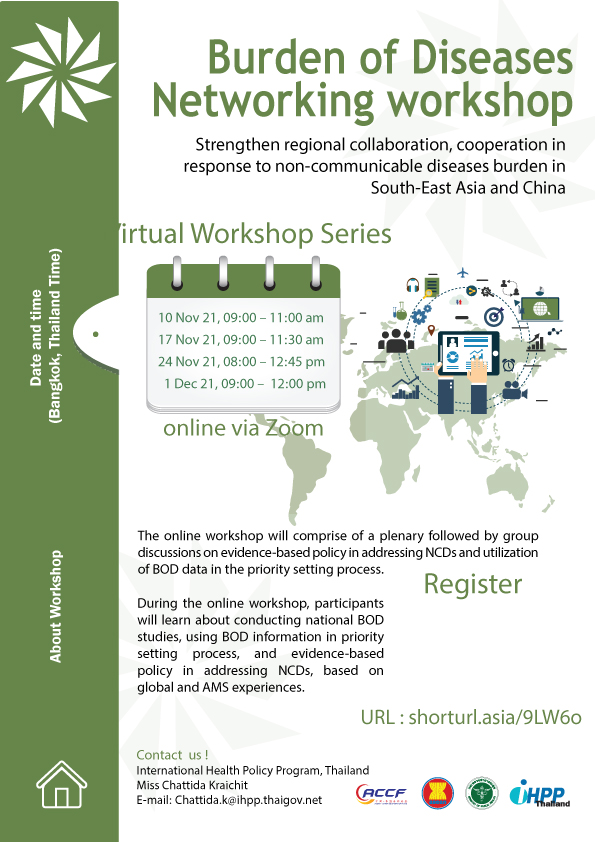Overview
Burden of Diseases Networking Workshop
Introduction
As ASEAN economics steadily progress, many ASEAN member states (AMS) are undergoing economic and epidemiologic transition demonstrated by the increasing longevity, urbanization and prevalence of non-communicable diseases (NCDs). The consumption of tobacco and alcoholic products are among the most significant preventable risk factors which contribute to disparities in NCDs in AMS. Therefore, AMS must address these challenging risk factors and the burden of NCDs for upcoming work on strengthening NCD governance capacity in South-East Asia region.
During the Sustainable Development Goals (SDGs) era, health policy makers need substantial evidence to support decision making on priority setting for health planning and resource allocation to achieve Universal Health Coverage. Burden of disease (BOD) represents a summary measure of population health which combines information on fatal and non-fatal health related loss. Moreover, it is an influential tool for quantifying the impact of various health risk factors on population health and for prioritizing major health outcomes for specific age groups. Understanding the true burden on each country is essential to track health progress, assess the impact of public health interventions, and inform evidence-based policy decisions.
Although BOD studies have already been fully or partially conducted in some AMS, the number of published research output, especially in resource-limited countries is disproportionate. Through synergistic collaboration among AMS, the capacity for health research and development will be enhanced to collectively progress towards achieving SDGs. In terms of ASEAN health cooperation, these networking activities can contribute to the “ASEAN 2025 Forging Ahead Together” as well as the Plan of Action (POA) to Implement the Joint Declaration on ASEAN‐China Strategic Partnership for Peace and Prosperity (2016‐2020) section 3.1 on Public Health.
Objectives
General objective: To establish a regional BOD network in South‐East Asia and China to address the burden of emerging NCDs, increase the awareness of BOD studies and encourage evidence-based priority setting for country health policy.
Specific objectives:
- To assess the availability and quality of data sources required for the BOD and SDGs estimation in each AMS;
- To assess capacity of BOD data utilization for policy in AMS;
- To develop an action plan of the future ASEAN-China BOD network.

Scope of the workshop
The online workshop will comprise of a plenary followed by group discussions on evidence-based policy in addressing NCDs and utilization of BOD data in the priority setting process. The workshop will be organized based on an analysis of the situation in ASEAN collected through a pre-workshop questionnaire, which will be circulated to all participants. The questionnaire aims to inform on the knowledge, technical capacity on BOD, gaps in information and resources, and challenges among AMS.
During the online workshop, participants will learn about conducting national BOD studies, using BOD information in priority setting process, and evidence-based policy in addressing NCDs, based on global and AMS experiences. Participants will have the opportunity to share their experiences and good practices, challenges and gaps in the implementation of health data and utilization of BOD information for health policies, and discuss their need for capacity building. Furthermore, in this workshop, homework on quality of BOD data sources and how the BOD information is used for policy making are assigned to AMS participants. At the end of the workshop, participants will develop a future networking plan for capacity building and technical assistance needed to achieve an ASEAN BOD Network.
Both international and national experts working in the field of BOD will be invited to join this workshop and play an important role in providing valuable insights on BOD and resources for capacity building.
Date/Time 10, 17, 24 November and 1 December 2021
Online host International Health Policy Program, Thailand
Online application Zoom application

Expected outcomes
- Knowledge gap of capacity development and technical assistance needed for BOD study in AMS;
- The mutual network among AMS and China for the collaboration and cooperation on BOD study will be established;
- Future action plan for capacity building on BOD study and utilization on policy between networking countries.



